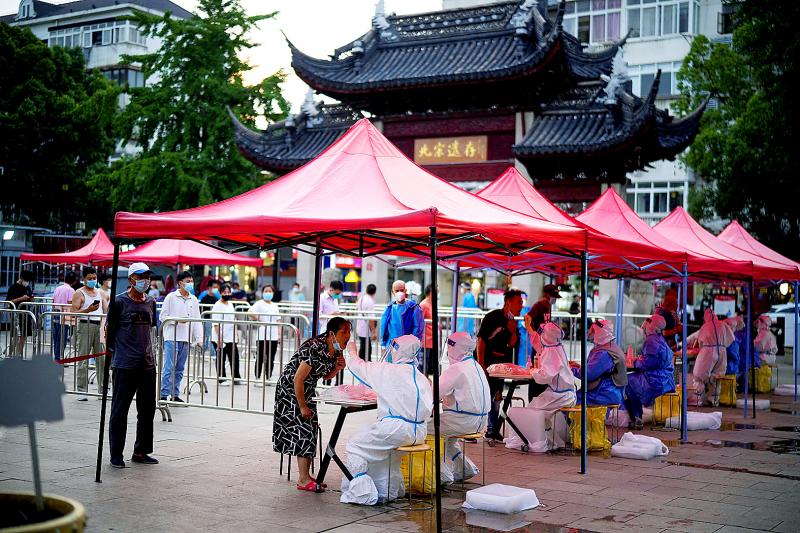Several large Chinese cities, including Shanghai, are on alert due to new clusters of COVID-19 infections, rolling out repeated mass testing or extending lockdowns on millions of residents, with some measures triggering a public outcry.
China has reported an average of about 390 local daily infections in the seven days ending on Sunday, higher than about 340 seven days earlier, according to Reuters calculations based on official data as of yesterday. That is tiny compared with a resurgence in other parts of Asia.
China is adamant about implementing its dynamic “zero COVID” policy of eliminating outbreaks as soon as they emerge. Previously, when a flare-up became a major outbreak, local officials had been compelled to take tougher measures such as month-long lockdowns, even at the cost of economic growth.

Photo: Reuters
Persistent outbreaks and more closures could add pressure on the world’s second-largest economy, which contracted sharply in the second quarter from the first after widespread COVID-19 lockdowns jolted industrial production and consumer spending.
Shanghai, yet to fully recover from the harsh two-month lockdown in spring and still reporting daily sporadic cases, plans to hold mass testing in many of its 16 districts and in some smaller areas where new infections had been reported recently, after similar testing last week.
“There is still an epidemic risk at the community level so far,” the city government said in a statement.
Shanghai reported more than a dozen new cases, but none was found outside quarantined areas, local government data showed.
“I’m speechless,” said a Shanghai resident surnamed Wang, already subject to testing every weekend at her residential compound. “It sounds like a waste of resources that doesn’t address the real problem.”
The northern city of Tianjin, which launched multiple rounds of mass testing in recent months to curb earlier outbreaks, yesterday said it was again testing its more than 12 million residents, after two local infections were found.
In the central Chinese city of Zhumadian, lockdowns for more than 1 million people in two towns under its jurisdiction are extended for a few days until today.
Temporary lockdowns for more than 3 million people in four other towns had been extended to yesterday. Zhumadian continues to report dozens of cases daily, despite curbs last week.
The southwestern city of Chengdu yesterday said it suspended various entertainment and cultural venues, widening such curbs over the weekend that had been limited to a few districts.
Beijing, after a week of zero local infections, yesterday found two local cases — one international flight crew member and the person’s roommate. Authorities have sealed up affected buildings.
In the southern city of Guangzhou, COVID-19 control staffers broke down the locks of apartment doors without residents’ consent, stirring an outcry on social media over the weekend.
Authorities in one district in Guangzhou yesterday apologized to residents.

Drug lord Jose Adolfo Macias Villamar, alias “Fito,” was Ecuador’s most-wanted fugitive before his arrest on Wednesday, more than a year after he escaped prison from where he commanded the country’s leading criminal gang. The former taxi driver turned crime boss became the prime target of law enforcement early last year after escaping from a prison in the southwestern port of Guayaquil. Ecuadoran President Daniel Noboa’s government released “wanted” posters with images of his face and offered US$1 million for information leading to his capture. In a country plagued by crime, members of Fito’s gang, Los Choneros, have responded with violence, using car

Two former Chilean ministers are among four candidates competing this weekend for the presidential nomination of the left ahead of November elections dominated by rising levels of violent crime. More than 15 million voters are eligible to choose today between former minister of labor Jeannette Jara, former minister of the interior Carolina Toha and two members of parliament, Gonzalo Winter and Jaime Mulet, to represent the left against a resurgent right. The primary is open to members of the parties within Chilean President Gabriel Boric’s ruling left-wing coalition and other voters who are not affiliated with specific parties. A recent poll by the

TENSIONS HIGH: For more than half a year, students have organized protests around the country, while the Serbian presaident said they are part of a foreign plot About 140,000 protesters rallied in Belgrade, the largest turnout over the past few months, as student-led demonstrations mount pressure on the populist government to call early elections. The rally was one of the largest in more than half a year student-led actions, which began in November last year after the roof of a train station collapsed in the northern city of Novi Sad, killing 16 people — a tragedy widely blamed on entrenched corruption. On Saturday, a sea of protesters filled Belgrade’s largest square and poured into several surrounding streets. The independent protest monitor Archive of Public Gatherings estimated the

Irish-language rap group Kneecap on Saturday gave an impassioned performance for tens of thousands of fans at the Glastonbury Festival despite criticism by British politicians and a terror charge for one of the trio. Liam Og O hAnnaidh, who performs under the stage name Mo Chara, has been charged under the UK’s Terrorism Act with supporting a proscribed organization for allegedly waving a Hezbollah flag at a concert in London in November last year. The rapper, who was charged under the anglicized version of his name, Liam O’Hanna, is on unconditional bail before a further court hearing in August. “Glastonbury,